中考英语语法专题 时间状语从句讲解+练习(无答案)
英语语法专题条件状语从句(讲解+练习,无答案)
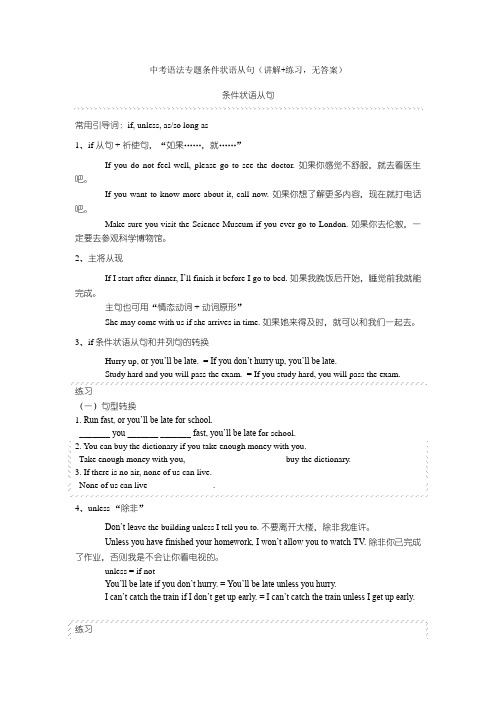
5. I won’t get to the party on time _____ I catch the first train tomorrow morning.
A. IfB. UnlessC. WhetherD. When
6. —Shall we go on a picnic this weekend? —Good idea! Unless it _____.
If I start after dinner, I’ll finish it before I go to bed.如果我晚饭后开始,睡觉前我就能完成。
主句也可用“情态动词+动词原形”
She may come with us if she arrives in time.如果她来得及时,就可以和我们一起去。
If you want to know more about it, call now.如果你想了解更多内容,现在就打电话吧。
Make sure you visit the Science Museum if you ever go to London.如果你去伦敦,一定要去参观科学博物馆。
2、主将从现
2. We will go camping if it _____ tomorrow.
A. Won’t rainB. didn’t rainC. doesn’t rainD. isn’t raining
3. I’m waiting for my friend. If he _____, I _____ swimming alone.
Take enough money with you, _______ _______ _______ buy the dictionary.
英语语法专题条件状语从句(讲解+练习,无答案)

中考语法专题条件状语从句(讲解+练习,无答案)条件状语从句常用引导词:if, unless, as/so long as1、if 从句 + 祈使句,“如果……,就……”If you do not feel well, please go to see the doctor. 如果你感觉不舒服,就去看医生 吧。
If you want to know more about it, call now. 如果你想了解更多内容,现在就打电话 吧。
Make sure you visit the Science Museum if you ever go to London. 如果你去伦敦,一 定要去参观科学博物馆。
2、主将从现If I start after dinner, I’ll finish it before I go to bed. 如果我晚饭后开始,睡觉前我就能 完成。
主句也可用“情态动词 + 动词原形” She may come with us if she arrives in time. 如果她来得及时,就可以和我们一起去。
3、if 条件状语从句和并列句的转换Hurry up, or you’ll be late. = If you don’t hurry up, you’ll be late. Study hard and you will pass the exam. = If you study hard, you will pass the exam. 练习 (一)句型转换 1. Run fast, or you’ll be late for school. _______ you _______ _______ fast, you’ll be late for school. 2. You can buy the dictionary if you take enough money with you. Take enough money with you, _______ _______ _______ buy the dictionary. 3. If there is no air, none of us can live. None of us can live _______ _______.4、unless “除非”Don’t leave the building unless I tell you to. 不要离开大楼,除非我准许。
中考专题之状语从句 条件时间状语从句练习题
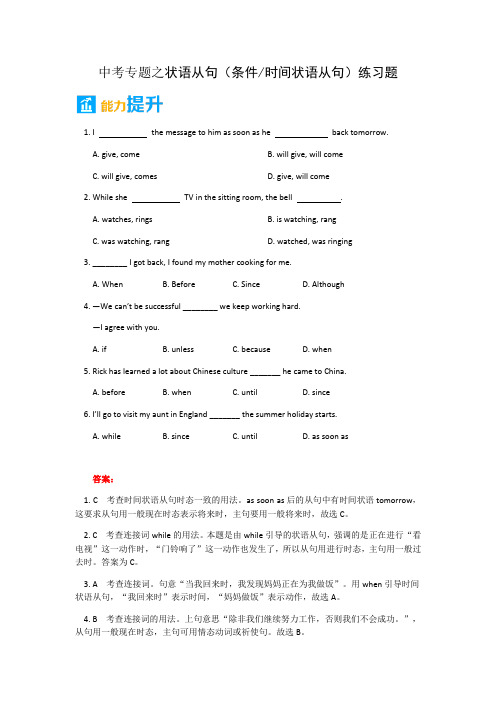
中考专题之状语从句(条件/时间状语从句)练习题1. I the message to him as soon as he back tomorrow.A. give, comeB. will give, will comeC. will give, comesD. give, will come2. While she TV in the sitting room, the bell .A. watches, ringsB. is watching, rangC. was watching, rangD. watched, was ringing3. ________ I got back, I found my mother cooking for me.A. WhenB. BeforeC. SinceD. Although4. —We can’t be successful ________ we keep working hard.—I agree with you.A. ifB. unlessC. becauseD. when5. Rick has learned a lot about Chinese culture _______ he came to China.A. beforeB. whenC. untilD. since6. I’ll go to visit my aunt in England _______ the summer holiday starts.A. whileB. sinceC. untilD. as soon as答案:1. C 考查时间状语从句时态一致的用法。
as soon as后的从句中有时间状语tomorrow,这要求从句用一般现在时态表示将来时,主句要用一般将来时,故选C。
2. C 考查连接词while的用法。
本题是由while引导的状语从句,强调的是正在进行“看电视”这一动作时,“门铃响了”这一动作也发生了,所以从句用进行时态,主句用一般过去时。
人教版中考英语复习专题 状语从句专项讲解及练习
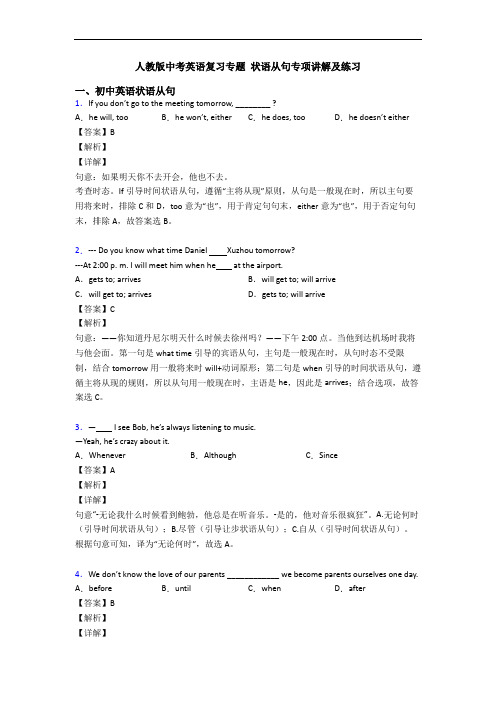
人教版中考英语复习专题状语从句专项讲解及练习一、初中英语状语从句1.If you don’t go to the meeting tomorrow, ________ ?A.he will, too B.he won’t, either C.he does, too D.he doesn’t either 【答案】B【解析】【详解】句意:如果明天你不去开会,他也不去。
考查时态。
If引导时间状语从句,遵循“主将从现”原则,从句是一般现在时,所以主句要用将来时,排除C和D,too意为“也”,用于肯定句句末,either意为“也”,用于否定句句末,排除A,故答案选B。
2.--- Do you know what time Daniel Xuzhou tomorrow?---At 2:00 p. m. I will meet him when he at the airport.A.gets to; arrives B.will get to; will arriveC.will get to; arrives D.gets to; will arrive【答案】C【解析】句意:——你知道丹尼尔明天什么时候去徐州吗?——下午2:00点。
当他到达机场时我将与他会面。
第一句是what time引导的宾语从句,主句是一般现在时,从句时态不受限制,结合tomorrow用一般将来时will+动词原形;第二句是when引导的时间状语从句,遵循主将从现的规则,所以从句用一般现在时,主语是he,因此是arrives;结合选项,故答案选C。
3.—I see Bob, he’s always listening to music.—Yeah, he’s crazy about it.A.Whenever B.Although C.Since【答案】A【解析】【详解】句意“-无论我什么时候看到鲍勃,他总是在听音乐。
-是的,他对音乐很疯狂”。
2024年中考英语专题复习精练—状语从句1
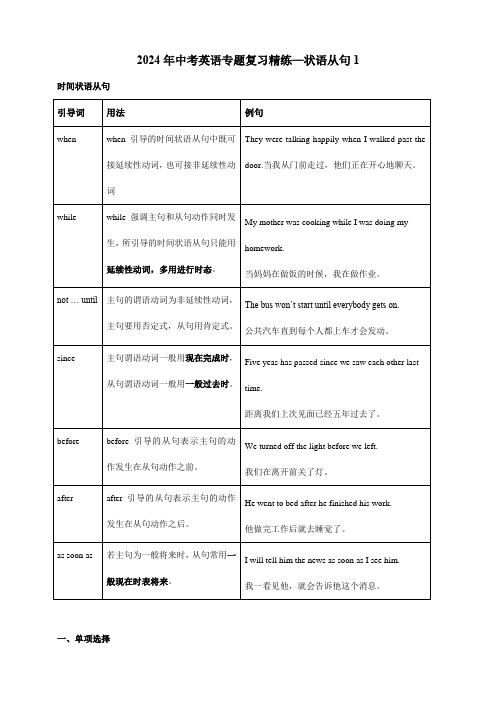
2024年中考英语专题复习精练—状语从句1时间状语从句一、单项选择1.—When did you finish your homework last night?—________ my mother came back from work.A.Until B.Not until C.Since D.As2.Love your parents ________ they are alive. Don’t wait until it is too late.A.while B.since C.because D.until3.—You look so tired. What’s wrong?—I didn’t go to bed ________ I finished watching In the Name of People last night.A.until B.if C.unless4.He will watch TV as soon as he ________ his work.A.will finish B.finish C.finishes5.— You didn’t answer my phone last night. What’s up?— Oh, I was so tired and I just fell asleep ________ I lay down on the bed.A.until B.though C.so that D.as soon as6.Just now, the managers kept arguing about the problem __________ they agree with each other. A.when B.although C.unless D.until7.—Dad, please tell me when Mum ________. I miss her very much.—She will return when she ________ her task. And she will bring a nice present for you.A.will return; finishes B.will return; will finish C.returns; will finish8.Time waits for no man. But some people won’t realize the importance of time ________ it’s gone. A.until B.as C.when D.since9.—Hey, Tony. ________ will the competition start? I can’t wait to watch.— ________ the famous scientist arrives here.A.When; Not until B.When; Until C.How long; Until D.How long; Not untilA.As soon as B.Before C.Since D.After11.My cousin will tell me about his trip after he _______ home tomorrow.A.arriving B.will arrive C.arrives D.is arriving 12.Time waits no man. But some people won’t realize the importance of time ________ it’s gone. A.until B.when C.since13.Bill and I are close friends. I have known him ________ he was born.A.when B.since C.while D.until 14.—Excuse me. When can we have the steak we ordered?—Not until it ________ in ten minutes.A.will be prepared B.is prepared C.has prepared D.was prepared 15.—Hello, may I speak to Mrs White?—I am sorry. She is in meeting now. I’ll call you back ________ she comes back.A.until B.as soon as C.before D.since16.—I don’t know if David ________ to have the meeting tomorrow.—Don’t worry. I will tell you as soon as he ________.A.comes; will come B.will come; comesC.will come; will come D.comes; comes17.—Why didn’t you try your best to get on the underground?—I tried to, but it started moving ________ I could get on it.A.before B.while C.as soon as D.after18.We were just ready to play basketball ________ it began to rain.A.as soon as B.before C.when19.I am going to buy a birthday present for Benny. Do you know________ ?20.Tina was too sleepy. She fell asleep ________ she was reading a book at the table.A.if B.while C.until参考答案:1.B【详解】句意:——你昨晚什么时候做完作业的?——直到我妈妈下班回来。
完整版)初中时间状语从句语法及练习(全)

完整版)初中时间状语从句语法及练习(全)状语从句是复合句中起修饰作用的从句,用来修饰说明谓语,包括地点、时间、原因、目的、结果、条件、让步、比较、方式和伴随状况等方面。
状语从句可以在句首或句末,从句后面常用逗号与主句隔开;放在句末时,从句前面往往不用逗号。
状语从句可以分为时间、地点、原因、目的、结果、让步、比较、方式和条件状语从句。
时间状语从句的从属连词有when。
while。
as。
before。
after。
till/until。
since。
whenever。
as soon as等。
主句和从句的时态一般是主将从现、主情从现、主祈从现。
When引导时间状语从句时表示“当……的时候”,既可以指时间段也可指时间点,从句中既可用延续性动词又可用瞬间性动词,且动作既可和主句的动作同时发生又可在主句的动作之前或之后发生。
当when引导的时间状语从句中一般用一般现在时表将来(主将从现)。
例如:I will call you when I get there。
While和as与when类似,都表示“当……的时候”,但while更强调主句和从句的动作同时进行,as则更强调主句和从句的动作相互呼应。
例如:While I was reading。
he was watching TV。
As I was leaving。
the phone rang.Before和after分别表示“在……之前”和“在……之后”,从句中用一般过去时表示过去的动作或用一般将来时表示将来的动作。
例如:I finished my homework before my mother came back。
After he finishes his work。
he will go to the gym.Till/until表示“直到……为止”,从句中用肯定句表示肯定的动作或用否定句表示否定的动作。
例如:I will wait for you until you finish your work。
中考专题之状语从句。条件时间状语从句练习题(解析版)

中考专题之状语从句。
条件时间状语从句练习题(解析版)1.我会在他明天回来后立即把信息交给他。
答案:C解析:句子中的“as soon as”引导时间状语从句,如果主从句的动作都没有发生,为了区分动作的前后关系,主句用将来时,从句用一般现在时。
所以答案为C。
2.她正在客厅看电视时,门铃响了。
答案:C解析:句子中的“while”引导时间状语从句,主句为过去进行时,从句用过去进行时。
所以答案为C。
3.当我回来时,我发现我的母亲正在为我做饭。
答案:A解析:句子中的“when”引导时间状语从句,表示“当……时”。
所以答案为A。
4.除非我们坚持努力工作,我们不能成功。
答案:B解析:句子中的“unless”表示“除非”,引导条件状语从句。
所以答案为B。
10.建议你在睡觉前完成作业,因此时间状语从句应填before。
11.直到我告诉XXX,他才知道这件事。
根据句意,应填until。
Mrs。
Weeks was reading a newspaper story to her classabout Children'XXX for money to buy toys for sick children who may be bedridden for weeks。
After reading the story。
Mrs。
Weeks had an idea。
The students suggested bringing money or their own toys。
but Mrs。
Weeks proposed making toys instead。
The whole class XXX.Great。
Let’s start making toys tomorrow,” exclaimed Mrs。
Weeks。
On Saturday afternoon。
she took her students to the hospital to deliver the toys they had made。
中考英语复习时间状语从句语法及练习(无答案)
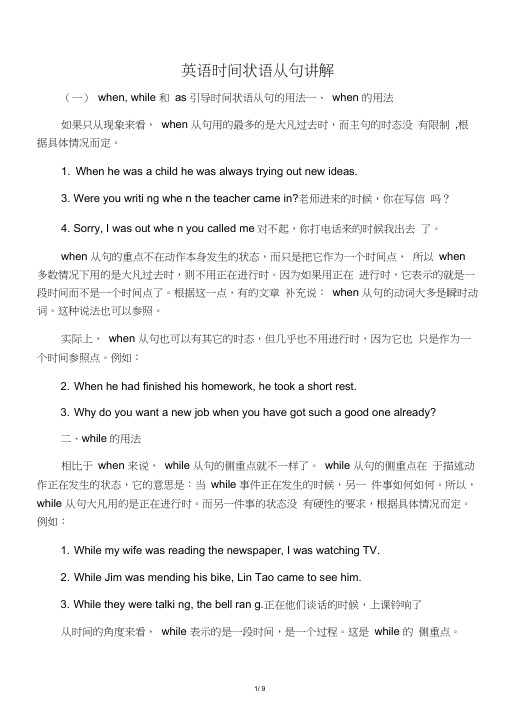
英语时间状语从句讲解(一)when, while 和as 引导时间状语从句的用法一、when 的用法如果只从现象来看,when 从句用的最多的是大凡过去时,而主句的时态没有限制,根据具体情况而定。
1. When he was a child he was always trying out new ideas.3. Were you writi ng whe n the teacher came in?老师进来的时候,你在写信吗?4. Sorry, I was out whe n you called me对不起,你打电话来的时候我出去了。
when 从句的重点不在动作本身发生的状态,而只是把它作为一个时间点,所以when 多数情况下用的是大凡过去时,则不用正在进行时。
因为如果用正在进行时,它表示的就是一段时间而不是一个时间点了。
根据这一点,有的文章补充说:when 从句的动词大多是瞬时动词。
这种说法也可以参照。
实际上,when 从句也可以有其它的时态,但几乎也不用进行时,因为它也只是作为一个时间参照点。
例如:2. When he had finished his homework, he took a short rest.3. Why do you want a new job when you have got such a good one already?二、while的用法相比于when 来说,while 从句的侧重点就不一样了。
while 从句的侧重点在于描述动作正在发生的状态,它的意思是:当while 事件正在发生的时候,另一件事如何如何。
所以,while 从句大凡用的是正在进行时。
而另一件事的状态没有硬性的要求,根据具体情况而定。
例如:1. While my wife was reading the newspaper, I was watching TV.2. While Jim was mending his bike, Lin Tao came to see him.3. While they were talki ng, the bell ran g.正在他们谈话的时候,上课铃响了从时间的角度来看,while 表示的是一段时间,是一个过程。
- 1、下载文档前请自行甄别文档内容的完整性,平台不提供额外的编辑、内容补充、找答案等附加服务。
- 2、"仅部分预览"的文档,不可在线预览部分如存在完整性等问题,可反馈申请退款(可完整预览的文档不适用该条件!)。
- 3、如文档侵犯您的权益,请联系客服反馈,我们会尽快为您处理(人工客服工作时间:9:00-18:30)。
时间状语从句常用引导词:when, while, as, as soon as, before, after, till/until, since1、when, while, as(1)三者均可表示“当……时候”,如果主句表示的是短暂的动作,而从句表示的是一段时间,三者可通用。
如:I met Kang Li while/when/as I was walking along the street.当我沿街散步时碰见了康丽。
Don’t make any noise while/when/as I am recording. 我录音时(你们)别发出声音。
(2)while1)while只能与持续性动词连用,且常用进行时态。
表示主句的行为在从句行为进行的过程中发生。
如:While they were crossing the Atlantic, many people died. 他们中的很多人在横渡大西洋时丧生了。
2)表示主句和从句的动作同时发生。
如:While the wife was cooking, the husband was watching TV. 妻子在做饭的时候,丈夫在看电视。
3)表示“然而”,主句和从句是两个对应的动作。
如:Lucy likes dancing while Lily likes doing sports. 露西喜欢跳舞而莉莉喜欢运动。
(3)when1)when既可以和持续性动作连用,也可以和瞬间性动作连用,主句与从句描述的动作既可以同时发生,也可以先后发生。
如:When the weather is fine, many people go out for a walk. 天气好时,很多人都出去散步。
When I got home, I found my baby girl singing in the sitting room. 我到家时,发现我的小女儿正在客厅里唱歌。
2)表示“某人正在做某事,突然……”,主句用过去进行时,从句用一般过去时,表示一个动作正在进行的时候,另一个动作(突然)发生了,强调后一动作发生的突然性。
如:We were talking when the teacher came in. 我们正在讲话,老师(突然)进来了。
试比较:While we were talking, the teacher came in. 我们正在讲话的时候,老师进来了。
(不强调突然性。
)3)表示“某人正要做某事,就在这时……”,主句用过去将来时,从句用一般过去时。
如:I was leaving when somebody touched my shoulder. 我正要离开,就在此时有人碰了一下我的肩膀。
(4)asas与when用法相似,但着重强调主句动作与从句动作同时发生,有“随着……”或“一边……一边……”之意。
如:As you get older, you get more knowledge. 随着年龄的增长,你获得的知识就越多。
They sing as they walk. 他们一边走一边唱。
练习(一)用when, while, as填空1. I was looking out of the window ________ the teacher asked me.2. What is he doing ________ his parents came back?3. Mike was playing games ________ Jack was studying.4. I was about to fall asleep ________ the baby began to cry.5. ________ the children walked along the lake, they sang happily.6. Someone stepped on my toes ________ I was waiting for the bus.7. ________ she grew older, she became more responsible.(二)单项选择1. When I got to the factory, the workers _____ about the film.A. are talkingB. talkedC. were talkingD. have talked2. I _____ a letter when my mother came in.A. writeB. am writingC. was writingD. have written3. My mother _____ while my father _____ TV.A. cooks; was watchingB. was cooking; was watching;C. was cooked; watchedD. cooked; watched4. They were sleeping _____ they heard a man _____ “help”.A. when; shoutingB. while; to shoutC. when; to shoutD. while; shouting2、as soon as表示“一……就……”,强调动作紧密相连。
如:We began to work as soon as we got there. 我们一到那儿就开始工作了。
We always go somewhere interesting as soon as the holiday begins. 假期一开始,我们就会去某个好玩的地方。
I will write to you as soon as I arrive there. 我一到那里就会给你写信。
(主将从现)3、before, afterbefore表示“在……之前”,after表示“在……之后”。
如:Before we begin dinner, my father gives thanks for the food. 吃饭前,我父亲会表达感激之情。
Mother sometimes prepares dinner after I come back from school. 妈妈有时在我放学回家后才准备晚饭。
4、until/tilluntil表示动作或状态一直持续到某一时刻,即“直到……”。
如:I will wait until/till you finish all the work. 我会等到你完成所有的工作。
(主将从现)主句用肯定句时,主句动作为持续性动作;主句用否定句时,主句动作为瞬间性动作,常用搭配not ... until “直到……才……”。
如:He waited until all the guests left. 他一直等到所有客人都走了。
The boy didn’t go to sleep until his mother came back last night. 昨晚那个小男孩直到他妈妈回来才去睡觉。
5、sincesince引导的时间状语从句常与完成时连用,表示“自从……”,而since从句部分用一般过去时。
如:I have known Bill since he was born. 从比尔出生起,我就认识他。
He has studied very hard since he came to our school. 自从来到我们学校,他学习就非常努力。
练习(一)在下列各句的空格中填入适当的连词1. ________ he was speaking, everybody listened carefully.2. Have a good look at that man ________ you pass him.3. Henry is in charge of the office ________ Mr. Smith is away.4. It was already eight o’clock ________ we got there.5. I was about to go out ________ a visitor came.6. He learned to speak German ________ he was in Berlin.7. I waited ________ he came back.8. He had learned Chinese ________ he came to China.9. ________ the work was done, we sat down to sum up experience.10. I haven’t seen him ________ he moved to the other side of the town.11. She likes everything to be in place ________ she starts to work.12. The thieves ran away ________ they caught sight of the police.13. They decided to go back home ________ their money ran out.14. ________ I get to the airport, I will phone you to pick me up.15. They were about to leave ________ it began to rain.16. He always stay in bed ________ lunch time.17. I like playing tennis ________ my younger sister prefers watching ball games.。
